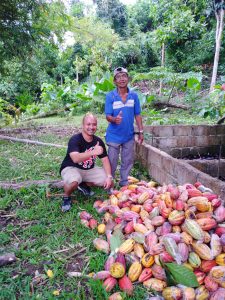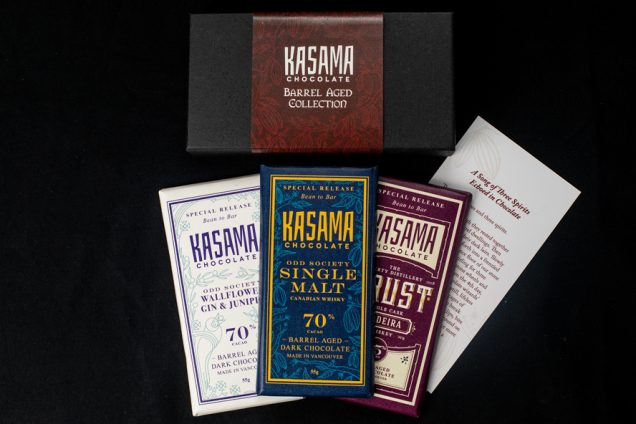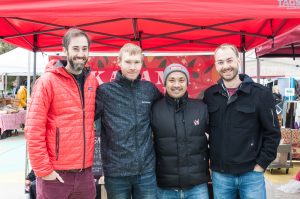Kasama Chocolate: From a hobby to full-blown business
Kasama Chocolate: From a hobby to full-blown business

Mang Ireneo and Vince Garcia with their cacao harvest
By Michelle Chermaine Ramos
The Philippine Reporter
This Vancouver-based chocolate brand opened its retail space on Granville Island at the time when the pandemic’s end was not yet in sight on January 1, 2021. Aptly named Kasama, a Pilipino (Tagalog) word for togetherness and friendship, the company was founded by four friends, Vince Garcia, Stefan Klopp, Dom Voser and Oliver Koth-Kappus as they stumbled upon the hobby of making homemade chocolate bars using cacao beans from Garcia’s family plot in the Cagayan Valley in the Philippines back in 2014.
After learning how to make chocolate through trial and error, the friends started the home-based business in 2015. They eventually rented a shared commercial kitchen space in East Vancouver and sold their products at farmers markets, craft fairs and speciality shops for the first few years prior to opening their own retail space.
The partnership turned out to be the perfect marriage of their complementary skills despite their lack of experience running a business. Garcia explained that he comes from a branding and marketing background, Voser is a fine artist who designs all their packaging, Klopp is a techie and web developer, Koth-Kappus has a food science background and is also a creative writer so everything is done in-house.
About 40% to 50% of their products use ingredients sourced from the Philippines like cacao, durian, mango and other fruits they like to experiment on to create their brand’s unique flavors. However, when the pandemic disrupted tourism and shipping schedules, their supplies got hit hard when 600 kilos of ingredients from Davao was held up at the Port of Vancouver for almost two months, prompting Garcia to travel to the Philippines last August to personally bring some supplies back to Canada. He spoke about the unique challenges they faced jumping headfirst into opening a retail space in the most uncertain times and harnessing the power of collaboration and community in building resilience.

The Kasama Barrel Aged Collection
How long have you been making chocolate as a hobby before you started the business?
Vince Garcia: It kind of happened by chance, or people like to say it’s a real good example of serendipity. I inherited a small plot of land in the northern part of the Philippines in 2014 and my dad suggested that we just sell the land because nobody lives there anymore and he sent back a picture. We had some cacao. I thought it was mangoes at the time. Then we thought it’s kind of funny if my dad could bring some cacao back from the Philippines, and he was able to, and just start off a hobby. This was back in 2014. We didn’t know what we were doing, had no prior experience running a business, nor making chocolates. So, we just went online and looked up some chocolate making forums, reached out to a few small makers around North America and just started making chocolates as a weekend hobby. I think it took at least six months and people started to pay us five bucks, just to eat whatever kind of chocolate experiments we had. So, we had a good six to eight months of just doing, I guess you could say R&D on a very hobby level on the weekend. It was when we went to Seattle to see the Northwest Chocolate Festival where it really opened our eyes in terms of seeing that there’s an actual industry for craft chocolate, specifically being the bar chocolate. And that’s where we started to take things a little bit more seriously and came up with our brand.
What made you decide to bravely open a retail space considering the pandemic had already been going on for a year then?
VG: We were to take over in March or April 2020, just right when the pandemic started. And we were hesitant, because we knew that a lot of our projections are based on assumptions that we’d have tourism. Granville Island was very kind to us and didn’t want us to get stuck, so they gave us a few months to really think about it. At the end of the day, we thought that it was just an opportunity that we didn’t want to give up. So, we were confident in our abilities to find ways. Again, this is where Stefan’s background in web development helped a lot because during the pandemic, a lot of our business transitioned online. Part of our ethos is to find solutions. Yeah, to be able to do that during a pandemic, people thought we were crazy. But I think people thought we were also crazy when we started making chocolate.

Kasama founders, from left: Stefan Klopp, Oliver Koth-Kappus, Vince Garcia, Dom Voser
Considering the unique situation you were in for your first year with a retail space, what were some of the biggest tactics you implemented to survive?
VG: One of the biggest challenges early on, especially opening during a pandemic, was attracting people to Granville Island, knowing that people were very hesitant to even go out at the time. So, Granville Island, its majority of visitors are from out of town so we lost all of that. We had to create ways of bringing back the locals and that’s the whole Support Local movement that’s happening around the country. It was our first time running a retail space so we didn’t know what to expect. We had to really keep our estimates and projections very, very modest and find ways to make it work in terms of where we’re allocating the money we’re making.
Luckily for us, farmers markets continued. A lot of our customers who go to the farmers markets live in and around the area here so they could come up anytime and we offered pickup by appointment for chocolate products. One interesting thing that we noticed too, is during the pandemic, apparently chocolate sales spiked, because people were staying home a lot and chocolates are a comfort food. We also noticed that orders were kind of doubling at the time in terms of number of bars per order. That’s something that we didn’t expect. So when we saw that there’s more of these online sales, we did more promotions online. And for people who are more aware of us online, we started our planning around using newsletters. Also coming up with new products at the time, I felt that people get excited when there’s a new product. That’s why our offerings expanded to almost 18 different chocolate bars at the time.
Reflecting on this crazy year, what would you say were some of the biggest lessons you’ve learned?
VG: It’s not a black and white type of answer but more the company culture we’ve started to create. Like I mentioned before, there were just four of us before and friends and family. But then when our team grew to where it is now, you don’t realize that we’ve actually been creating a culture since day one. Even how we do our hiring process is completely unorthodox in terms of not a standard interview. Some people on the island or some who started off as customers started asking more questions, showing more interest, and we thought they could potentially be a good addition to the team.
There’s a certain type of autonomy that we operate within. I think the fact that the four of us started this business coming from very different backgrounds made it work. Adding people to the Kasama team, who also have very different backgrounds from us, they don’t have to fit a certain mold. A lot of our products are just ideas that came from someone else on the team. It wasn’t from the four founders. Even our customers will come in and give us ideas and the next thing you know, two weeks later, we have a new product. So, it’s a very collaborative way of operating a business. The strength of what this company is today is because of that. Rather than being very hierarchical and decentralized, it’s more horizontal, yet still very much a small operation. But, compare it to other small businesses that started around the same time, we’ve definitely grown pretty fast.
Comments (0)